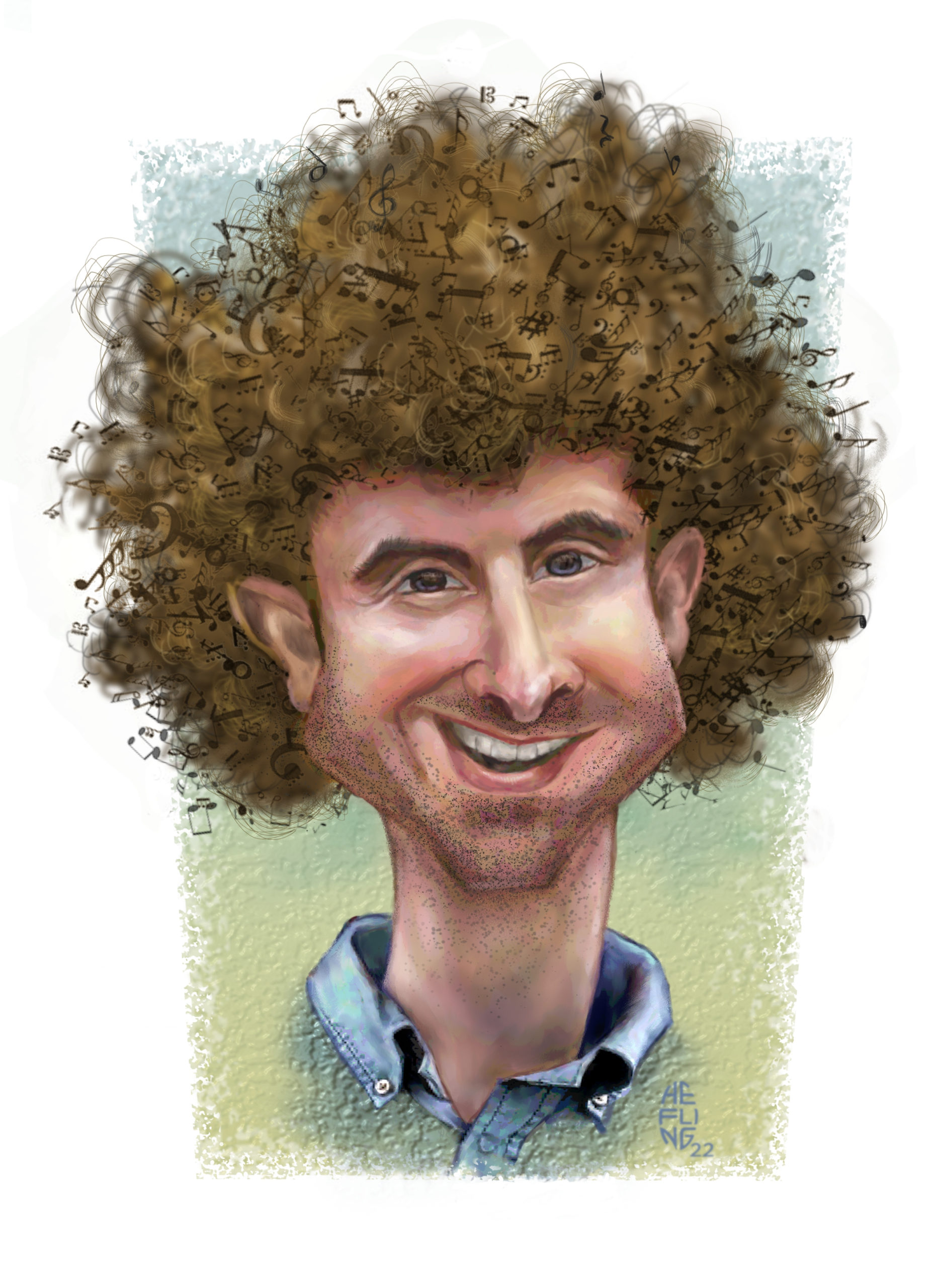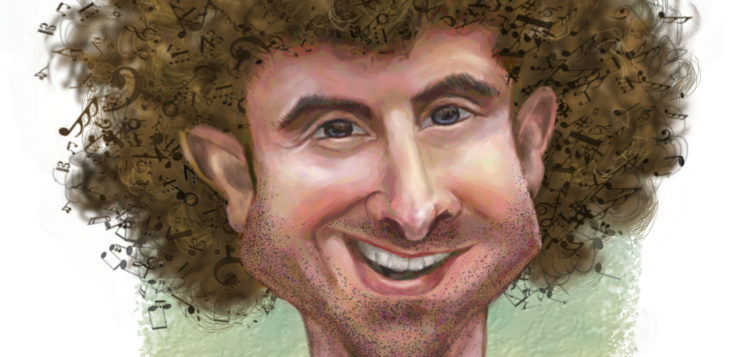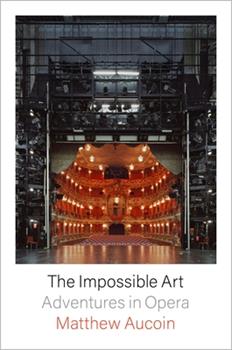SEVEN YEARS AGO, I had the good fortune to attend the American Repertory Theater’s production of Matthew Aucoin’s newly completed opera Crossing at the Schubert Theater in Boston. Afterwards in my journal, I noted: “Exciting to be there at the premiere of a gorgeous new opera by a Wunderkind who surely will be going places in the next few years.”
The Wunderkind, then a mere 25 years old—he was born in 1990, in the Boston area—has indeed gone places. The next year, Aucoin was appointed Artist-in-Residence at Los Angeles Opera, and in 2018 he won a MacArthur “Genius Grant” Fellowship. To date, he has written three operas, several orchestral works, and almost two dozen chamber music pieces. In addition to being a splendid composer, Aucoin turns out to be a superb writer as well. Recently issued by Farrar, Straus and Giroux, The Impossible Art: Adventures in Opera, is an extended essay on the outlandish absurdity—but also the “inextinguishable life force”—of this 400-year-old art form.
In the face of the “impossibility” of opera, which he calls “this perpetual sense that the real thing is just out of reach,” Aucoin sets out to explain why he loves opera. He is a composer and a listener who prefers the interior adventures of opera, the “life-and-death urgency” of it, over the extravagant public spectacles, and he writes passionately and cogently about opera’s capacity to communicate these inner experiences.
The book is not a chronological history of opera but rather an investigation of some key aspects, seen in a few carefully selected works. Thus there is no discussion of Wagner or Handel or Rossini, to name just a few of the towering figures in opera history. But Aucoin’s brilliant close readings of the operas that he does cover stand on their own merits. He follows in the tradition of other musicians who happen to be excellent writers: Leonard Bernstein, Ian Bostridge, Alfred Brendel. The way he takes his readers through the musical progression of a score is wonderfully exciting, giving us the “adventure” that his title promises. He is enormously savvy about music—the way it can scald, fizz, burble, and snarl, all verbs he deploys with panache.
 We are in the company of a working composer, one who has intimate knowledge of how a piece of musical drama works. Aucoin possesses an uncanny ability to nail down a composer’s style in a single, spot-on phrase: the “musical cubism” of Stravinsky; the “persistent tension between Apollonian and Dionysian energies” in Monteverdi; the “matchless honesty and directness” of Verdi, a composer who is the “least likely to make a misstep in dramatic pacing or psychological portraiture.” Indeed, Verdi’s three operas based on Shakespeare seem to have inspired some of Aucoin’s most trenchant descriptions: Macbeth is “a bloody prime cut of Italian opera”; Otello is full of “molten swiftness”; Falstaff is an “unexpected late-inning about-face.” The process of adapting a play by Shakespeare, Aucoin observes, “is a little like forcing the original text to drink a concoction out of Alice in Wonderland: some features of the original shrink or evaporate, while others are magnified to unrecognizable dimensions.”
We are in the company of a working composer, one who has intimate knowledge of how a piece of musical drama works. Aucoin possesses an uncanny ability to nail down a composer’s style in a single, spot-on phrase: the “musical cubism” of Stravinsky; the “persistent tension between Apollonian and Dionysian energies” in Monteverdi; the “matchless honesty and directness” of Verdi, a composer who is the “least likely to make a misstep in dramatic pacing or psychological portraiture.” Indeed, Verdi’s three operas based on Shakespeare seem to have inspired some of Aucoin’s most trenchant descriptions: Macbeth is “a bloody prime cut of Italian opera”; Otello is full of “molten swiftness”; Falstaff is an “unexpected late-inning about-face.” The process of adapting a play by Shakespeare, Aucoin observes, “is a little like forcing the original text to drink a concoction out of Alice in Wonderland: some features of the original shrink or evaporate, while others are magnified to unrecognizable dimensions.”
While he acknowledges the stereotype of opera as “a circus for the superrich,” Aucoin conveys an infectious passion for opera’s modern possibilities. He is intimately knowledgeable about contemporary opera. His discussions of the complex music dramas of Harrison Birtwistle, Chaya Czernowin, and Thomas Adès (“the guy who wrote the blowjob opera”) make for exciting and stimulating reading. Other contemporary composers whom he mentions in passing—Barry Anderson, Kaija Saariaho, Ash Fure, Andrew Norman—underscore Aucoin’s respectful, sincere, and generous regard for his compatriots.
Aucoin’s prose can be by turns smart, funny, hip, elegant, playful. He presumes a familiarity with certain technical musicals terms, such as ritornello, coloratura, melisma, hemiola, appoggiatura, which he uses without defining them. I mention this fact not to scare away potential readers, but to signal that an occasional trip to a dictionary may be necessary. He is also not at all shy about referencing pop culture icons, including the Beach Boys, RuPaul’s Drag Race, Radiohead, and Joni Mitchell. He is delightfully unabashed in his enthusiasm for and amazement at certain classical composers. And he humbly admits when some of the musical miracles he writes about “remain impossible to describe.” Nor does he draw back from looking candidly at his own career as a composer and a queer artist.
Having majored in literature at Harvard, Aucoin devotes an entire chapter to his love affair with Walt Whitman (“more operatic than opera itself”), whose life and poetry became the basis for his 2015 opera Crossing. He loves Whitman’s fanatical optimism, his awareness of “the blazing sacredness of all things,” even as he confesses to disliking “the sheer badness” of some of Whitman’s poetry. He’s also refreshingly forthright about the deficiencies of Crossing, calling it “an embarrassingly obvious self-portrait.”
One of the most interesting aspects of the book is the attention that Aucoin pays to librettists, the dramatists who write the book upon which an opera is based. He notes that the “precarious journey from speech to song” that every opera composer undertakes is a collaboration that, as composer John Adams once said, is “next to double murder-suicide.” His chapter on Igor Stravinsky’s opera The Rake’s Progress pays homage to its principal librettist W. H. Auden, whose “Houdini-esque dexterity” Aucoin praises. Franco Maria Piave, who selflessly collaborated with Verdi on ten operas, is also singled out. The book includes an interesting verbatim conversation with Sarah Ruhl, the librettist for Aucoin’s opera Eurydice.
The Impossible Art ends with a magnificent examination of Mozart’s masterpiece Le nozze di Figaro, which Aucoin deems a work capable of transcending opera’s impossibility, indeed a work that “achieves an aerial view of the human soul.” That chapter, “Music as Forgiveness,” the shortest in the book, left me full of gratitude—to Aucoin for writing so beautifully and to Mozart for writing so heartbreakingly.
Philip Gambone, a regular contributor to this magazine, sang in three operas during his college years and (thankfully) never again after that.







